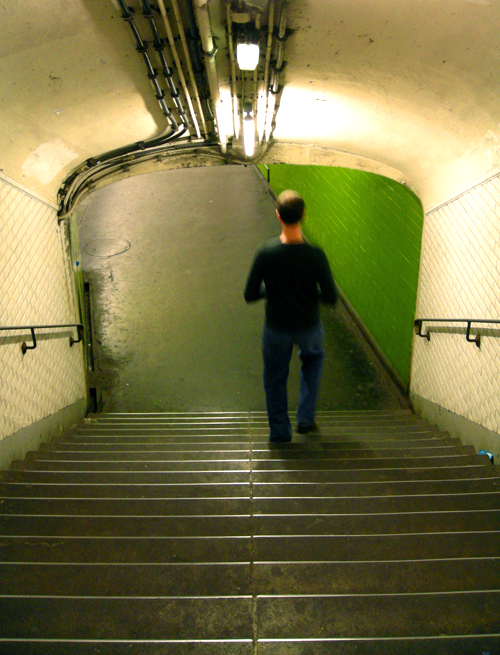day 52

walking through chatelet metro after seeing a sasha waltz work at theatre de la ville.
we saw the 1993 work travelogue 1, and although it's an old work, I thought it would be amazing: like watching an early pina bausch or DV8 work - they can still shatter you. but this didn't.
none of us ever think our works will date, but the impact of fashion is insidious. so it was interesting to see a well known company with a work that, although obviously amazing at the time, was clearly of its time, which was now, just a bit ordinary.
one of the characters in american beauty says that there is nothing worse than being ordinary. but dance is hard - we expect it to be of the moment, but also want it to be timeless: yet another dance dichotomy...
5 Comments:
I actually think this dichotomy is not just dance related but is also what we wish for of our relationships, our home and its decor, our fashion, hair styles: everything that we try to find meaning or identity through or represent ourselves through.
What do you think?
if a piece of work truely speaks of fundamentals, of basic human truths or insights then surely it will remain timeless. The methodologies used to express that truth may change, the skin it gets wrapped in will be of their time, but the bones and muscle should be where the essence lies. This is true of people. Fashion cannot hide who you really are, at least not from yourself. Andrew.
I sometimes think we get closer to the truth - the bare bones of it - the older we get. Life puts us through the wringer, the mill, the transformational experiences that keep opening our eyes to the nature of things. Shakespeare's language has dated but the themes seem timeless.The more we know, the more we can read into it based on our own experience. Maybe this is the crux of it - a truly timeless piece speaks more to you, with experience , while the fashionable fades in both significance, relevance and meaning, the more you know. It make s me wonder if I was to see the same work, would I find it as dated as you? Or is your expert status and experience forcing/allowing/enabling you to see more than you ever could before?
Bobby your point about my literacy with this kind of work is very valid. but both gordon and another writer friend who came also thought it was a bit dated and a bit ordinary – so I’m not sure.
it's not that the work was even 'fashionable' (although I didn't see it in 1993) that worried me, it's more the complexities of living in the moment seeping into our modes of expression. perhaps Andrew is talking about the need to constantly strip ourselves bare when we present work, so that the ‘fundamentals’ of why we choose to communicate through art can be seen? does this come back to finding an original voice? I suspect that at the time, working with the banal and the simple may have tapped into a societal consciousness that didn’t have a voice. the ‘newness’ of this work might have made it’s impact more profound. I’m not sure. but I do think Jane is right – we want the ‘now’ and the ‘timeless’ in everything – to our detriment.
these are questions that need to be asked all the time. the older I get the more demanding I am of performance, simply because I have been through a lot and I want to see the real complexities of life on stage. not just a ‘representation’ of them. for me, Shakespeare got it right because he revealed the underbelly of us as humans: our hatred, our lust, our desire, our anger, our love. but as has been pointed out, his mode of presentation has dated him so much that many generations have missed out on those revelations. are you saying it’s up to us to bring our experiences to the work? is it up to us (as audience) to find the essence of what a good artist is saying?
well... yes and no. yes, because we are constantly filtering experiences through our own layers of understanding, taste, context, insight, ability to grapple with ideas, images, emotions. Even when we aren't consious of it, we bring with us our whole history, and we choose I think what we will, based on all sorts of stuff; how we feel, whether we can cope, whether we're ready, whether we are on familiar ground. Even in science communication the principle is the same; the audience is not a blank slate on whom we can write our artistic or educational or scientific intentions, and choose what is reflected back.
what people hear, see, think is up to them.
but perhaps a good artist is one who expresses their intentions, in myriad subtle ways, to feed our reactions, perhaps guide them, shape them, persuade them. we can control to some extent the journey we want our audience to take, through structure, form, language, narrative. but every journey, every journeyer is different. That's what I like about Day 53 - the artist's recognition of the audience's unique journey.
Post a Comment
Links to this post:
Create a Link
<< Home